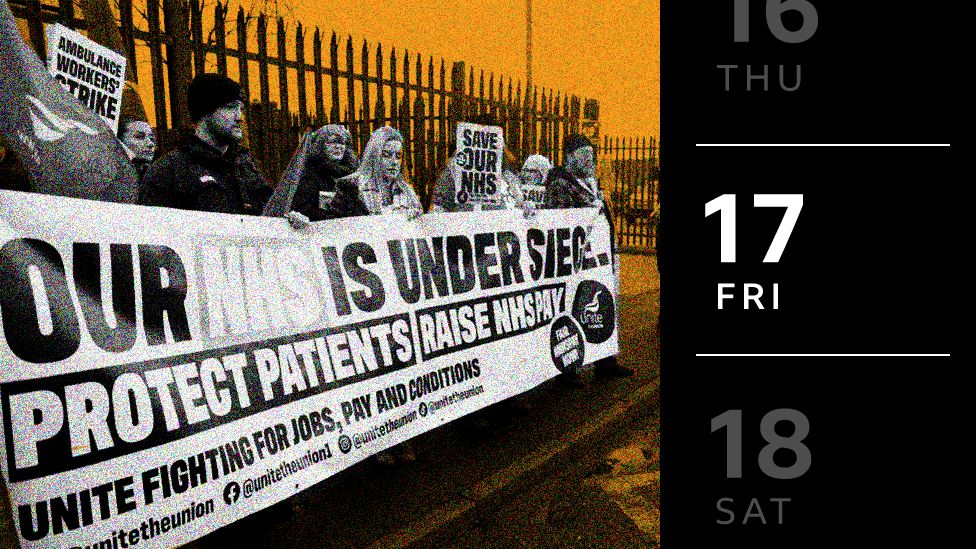文章管理 查看文章


Border Force staff are beginning a four-day series of strikes on Friday during half term for many UK schools.
UK staff working at the Port of Dover but also Calais, Port of Dunkirk and Coquelles Channel Tunnel Terminal are taking industrial action.
People arriving in the UK on Friday should prepare for border disruption, according to the Home Office.
In addition, ambulance workers are striking in the West Midlands and Northern Ireland on Friday.
The action is being organised by the Unite union, which says that essential emergency cover will be in place.
You can read more or watch this report about why people are taking strike action, and below you can find information on how it could affect you.
Upcoming strike action
FRI3FEBTrain drivers
Read more: Train drivers to go on strike
Teachers in Scotland
Read more: Which schools will teachers' strikes affect?
Bus drivers on strike
SAT4FEBThere are currently no national strikes planned for this date
SUN5FEBThere are currently no national strikes planned for this date
MON6FEBNurses in England
Read more: What do the strikes mean for patients?
Ambulance staff
Read more: Why are ambulance staff striking?
TUE7FEBNurses in England on strike
Read more: What do the strikes mean for patients?
WED8FEBThere are currently no national strikes planned for this date
THU9FEBPhysiotherapists take action
University staff
Read more: Why are university staff striking?
FRI10FEBAmbulance staff
Read more: Why are ambulance staff striking?
University staff
Read more: Why are university staff striking?
SAT11FEBThere are currently no national strikes planned for this date
SUN12FEBThere are currently no national strikes planned for this date
MON13FEBThere are currently no national strikes planned for this date
TUE14FEBUniversity staff
Read more: Why are university staff striking?
WED15FEBUniversity staff
Read more: Why are university staff striking?
THU16FEBAmbulance staff
Read more: Why are ambulance staff striking?
University staff
Read more: Why are university staff striking?
FRI17FEBAmbulance staff
Read more: Why are ambulance staff striking?
Border Force
SAT18FEBBorder Force
SUN19FEBBorder Force
MON20FEBAmbulance staff
Read more: Why are ambulance staff striking?
Border Force
TUE21FEBTeachers in Northern Ireland
Read more: NI teachers to walk out for half a day
University staff
Read more: Why are university staff striking?
WED22FEBAmbulance staff
Read more: Why are ambulance staff striking?
University staff
Read more: Why are university staff striking?
THU23FEBAmbulance staff
Read more: Why are ambulance staff striking?
University staff
Read more: Why are university staff striking?
FRI24FEBAmbulance staff
Read more: Why are ambulance staff striking?
SAT25FEBThere are currently no national strikes planned for this date
SUN26FEBThere are currently no national strikes planned for this date
Border Force strikes
The PCS union expects 1,000 of its members at the ports of Calais, Dunkirk and Dover, and the Coquelles Channel Tunnel Terminal, to walk out between Friday 17 February and Monday 20 February.
Military personnel and civil servants have been trained to step in and carry out border checks, although military personnel will not be going to France.
Nevertheless, the government said people should prepare their families for longer waiting times at border control.
People should use eGates where possible, and check with operators before travelling, it said.
Which ambulance staff are striking?
Hundreds of members of the Unite trade union are striking on Friday in Northern Ireland and the West Midlands. People are still advised to call 999 in an emergency.
Ambulances will still be sent to the most life-threatening calls - known as Category 1, which includes cardiac arrests.
Patients that need lifesaving treatment, such as kidney or cancer care, will also be transported.
Less urgent calls - known as Category 2, which includes some strokes and major burns - might have to wait longer than usual for an ambulance.
The NHS advice is:
How are you affected by the strikes? Are you taking part in strike action? You can email: haveyoursay@bbc.co.uk.
Please include a contact number if you are willing to speak to a BBC journalist. You can also get in touch in the following ways:
If you are reading this page and can't see the form you will need to visit the mobile version of the BBC website to submit your question or comment or you can email us at HaveYourSay@bbc.co.uk. Please include your name, age and location with any submission.
Related Topics